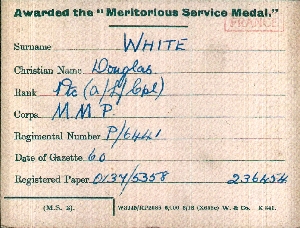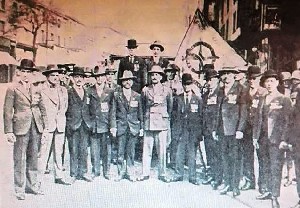Photo: Michael White with Thanks

Meritorious Service Medal Index Card
Medal Index Card 1
Medal Index Card 2

The Nottingham Evening Post 24/05/1929
In 1901, Douglas was residing at 20 Beechcroft Road, Oxford, with his brothers Stewart [born, 24th September 1886] and Bruce [born Herne Bay, 1888], who were all staying with their Cousins, Claude Moore [School Master born, 1865, Lydford, Devonshire], and his wife Clara [born 1868, London], and their two children Philip [born 1890, London] and Kate [born 1898, Oxford].
Douglas was a Drapers assistant. He had enlisted as a private/trooper into the 1/1 Northumberland Hussars on the 18th September 1914, at Newcastle-upon-Tyne, with the service number 848, trade stated was a Warehouse Manager by this time. He was 6 feet tall, Light Blue eyes, stated religion C of E., and was aged 25 years and 6 months when he enlisted.
He married on the 29th September 1914, Lotte M. Green in New Forest/Lyndhurst, Hampshire. He did not tell his father, who took it very well when told.
In a letter dated 10th August 1964, Douglas writes to his brother Bruce:-
"We have got our golden wedding anniversary coming up on Sept 29th. We had known each other for about 2 years and I was in Newcastle at the time. She came to stay with my landlady as chaperone for a fortnight just the time old Kaiser Bill had his eye on England in fact war was declared while she was staying with me. It took her three days to get from Newcastle to Bournemouth, the authorities kept collaring the trains to move troops leaving passengers stranded, what a lark. Well I joined up some time after and was sent to join a regiment at Lyndhurst near Bournmouth. Lotte used to come over every day to see me we were not married then.
But it was arranged that we could be married in Lyndhurst which we did on 29th September. I was in camp "under canvas" and the division, the 7th was mobilised in the district. Dad came over one day to see me and while he was talking to me I spotted Lotte coming. I said to him Dad here comes someone I would like you to meet. I can see him now, he stood, brushed himself down, straightened his coat and when I said Dad meet my wife I thought he could have dropped for he did not know we were married. However he was very good to her and saw he back to the station and comfortable on the train etc. She was very impressed. Well we completed mobilisation and sailed for Belgium on Oct 5th and that was that. I was out there 5 years altogether with the exception of about 2 months in hospital."
Douglas embarked for France on the 4th October 1914 on the ship 'Minneapolis', and disembarked at Zeebrugge on the 5th October 1914.
The Northumberland Hussars at this time were being used as a Flank Guard with the 7th Division and the 3rd Cavalry Division.
Douglas was sent to France from the 5th October 1914 till the 15th October 1916.
He was promoted in the field to an unpaid acting Lance/Corporal, on the 18th March 1915, then promoted again as acting Corporal on the 1st July 1915.
The Northumberland Hussars were involved in the First Battle of Ypres. On October 14th they entered Ypres recently looted by the Germans. But the fabric of the place was completely untouched. October 15th, during a patrol, Sergeant Major Hannington brought down a Uhlan [German Cavalry] with his rifle.
On the 21st March 1916, Douglas was admitted to the 23rd Field Ambulance [part of the 7th Infantry Division], station suffering from Tonsillitis. He returned to his squadron on the 26th March in the field.
Douglas was officially discharged from hospital on the 31st March 1916.
He then was transferred to XIII Corps for the Military Police.
On the 15th October he was admitted to Hospital, returning to the UK, with Impetigo Contagiosa.
[Impetigo is a highly contagious bacterial skin infection, and impetigo contagiosa is the most common type]. It causes skin sores and blisters which then burst, eventually leaving a honey coloured crust on the skin.
He was discharged from hospital on the 2nd December 1916. In his service records are some items listed he was given for his condition, Cold Tar Soap, unfortunately is the only one item readable!.
His address stated at this time was 'Bruern' Alexandra Road, Parkstone, Poole. Dorset.
Douglas then joined the Military [Mounted Branch] of the Military Police temporarily, sent to France again on the 20th December 1916, from Southampton, arriving at Le Havre on the same day. Douglas then was acting L/Corporal, service number P6441, from the 4th January 1917, he was based at the 5th Garrison Base Depot in France, until the 4th January 1917, when under Army Council Instruction No 1733 of 1916 he was officially transferred temporarily to the Mounted Military Police.
Douglas left the Army on the 11th May 1919, at Crystal Palace, which was the Dispersal point for his unit at the time. He stated his residence address then as 'Normanhurst' The Avenue, Rowledge, Near Farnham. He survived the War.
He was awarded the 'Meritorious Service Medal' [Date of Gazette 60], and 1914 'Mons' Star, British War Medal and the Victory Medal.
He was a salesman for a grocery chain for many, many years living in Nottingham for 30 odd years.
When that company wound up, he went to work in a grocery store somewhere in Kent, getting up at 5 each morning and going by train to work and getting home about 7 each evening. He worked there until the owner sold the shop. He then retired himself – at 75. He was doing 14 hour days at 75!
Amongst his service records is a letter from the Nottingham Branch of the 'Old Contemptibles' Association' dated December 1937, [address given as 73 South Road, Nottingham], querying his '1914' Clasp, in which he sent his discharge papers to confirm his award to the Army records office, he wanted the words 'and clasp' to be added to his file. He had been 'proudly' chairman of the local 'Old Contemptibles' Association' for the last ten years, [1928 to 1938].
On the 25th June 1925, the Old Contemptibles' Association was founded by Captain J P Danny R.A.’ The ‘Old Contemptibles’ refers to the First British Expeditionary force sent to the Western Front at the beginning of the First World War in August 1914. The German Emperor Kaiser Wilhelm II who was famously dismissive of the BEF, reportedly issued an order on 19 August 1914 to "exterminate ... the treacherous English and walk over General French's contemptible little army". Hence, in later years, the survivors of the battle dubbed themselves ‘The Old Contemptibles’. The association that was founded at this building was to provide a network of social clubs to support veterans of the First World War. There were 178 branches in the UK and 14 overseas of which this is one surviving example. All members were known as ‘chums’.
Photograph from the The Nottingham Evening Post shown on the right is : Chums of the Nottingham Branch of The Old Contemptibles' Association photographed on the 24th May 1929 as they prepared to travel to London to participate in the Empire Day celebrations held at Hyde Park. Of the 21 members of the branch, ten were at that time unemployed. Douglas is believed to be far left in the photo.
He died in September 1983.
With thanks from Michael White B.A JP (Australia)
Source: With Thanks Corps of the Military Police. North Tyneside Libraries.
Douglas was the younger brother of Captain Stewart Alexander White

